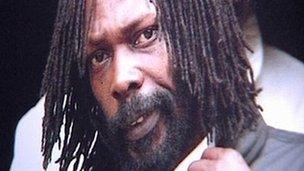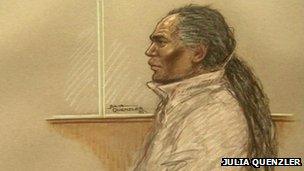Wendell Baker double jeopardy case: 16-year journey to justice
- Published

Wendell Baker denied rape
In the early hours of a January morning in 1997, Hazel Backwell was asleep in her home.
An intruder broke in, struck her over the head, tied her hands behind her back and raped her.
She then spent 15 hours incarcerated in a cupboard below the stairs before she was found by a friend who raised the alarm.
After more than 16 years, her attacker Wendell Baker has been convicted of raping her.
But why has it taken so long for the rapist to be brought to justice?
At the time Baker was arrested, his DNA matched that found at the scene. The chance the DNA was not his was a one in a billion, the Old Bailey heard.
Documents 'vanished'
But at the beginning of the 1999 trial, after legal argument that the DNA had not been collected in the correct way, the judge made the decision to exclude the evidence.

Hazel Backwell died in 2002
The judge decided the case could not proceed so Baker was found not guilty and freed.
The Old Bailey's decision to exclude DNA evidence was successfully challenged in the House of Lords in 1999.
Yet under the 800-year-old double jeopardy law, Baker could never face trial for the same crime after being cleared at the first hearing.
But the Stephen Lawrence case, and the public concern surrounding the acquittal of the men who were accused of his murder, led the law to be changed.
The double jeopardy rule was scrapped by the Criminal Justice Act 2003, which took effect in 2005.
Now there could be a retrial, as long as there was compelling new evidence.
But there was another problem - some of the files critical to the case had been lost.
Under cross-examination at the Old Bailey, Det Cons Paul Rogers was asked if it was correct that "everything" in the police's possession, apart from items recovered from a doctor, had "vanished".
"Yes," he replied.
There had been "extensive searches" and inquiries involving the police, Crown Prosecution Service, courts and the General Registry - but no papers could be found, the court heard.
But an article published in the Daily Mail and a two-year investigation for the BBC by Richard Bilton put pressure on the Met to have another look for the files. Copies were found to be at a firm of defence solicitors.
It took a court order in 2010 for the defence solicitors to hand the copies over to police.
'Death fears'
After further delays, as Baker took on a number of barristers before the trial, the case finally returned to the Old Bailey this month.
Prosecutor Rosina Cottage QC told the court: "However much he denies it, all DNA roads lead to one man - this defendant."

Wendell Baker said the police hated him and framed him
Jurors heard a statement from the victim, who died in 2002, which read: "I just thought, 'finish it, end it, get out'.
"I thought I was going to die. My breathing had never been so bad."
Ms Backwell, then 66, described the intruder to police as a man aged 30 to 40, white, with a slight accent.
However she admitted she had only seen him briefly and was not wearing her glasses, the court heard.
The judge excluded other character evidence from the trial, which the BBC can now report following the verdict.
Baker has a conviction for assault occasioning actual bodily harm on a former girlfriend
When Baker was arrested in September 2011 he allegedly threatened a female police officer with sexual violence
During a police interview Baker admitted he took "significant quantities" of crack cocaine
Previous convictions
Baker, 56, of Walthamstow, east London, denied ever attacking or raping the victim, and said he never knew her, her friends or family.
Under cross-examination, he told Rosina Cottage QC the police hated him and framed him.
Asked why they would frame him, he replied: "Hate."
Asked how officers could obtain his semen to frame him, he told Ms Cottage: "They could have gone to somebody's house and gone through the bins.
"Some officers frequented a house that I used to go to."
He said he "didn't know for sure" but officers could have obtained one of his used condoms.
The jury heard Baker has three previous convictions for burglaries in 1974, 1980 and 1991.
He pleaded guilty in August 1993 to assaulting his girlfriend and also admitted affray in May 2001.
After 16 years, Hazel Backwell's rapist has been brought to justice.
- Published21 June 2013
- Published21 June 2013
- Published12 June 2013
- Published11 June 2013